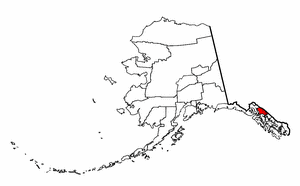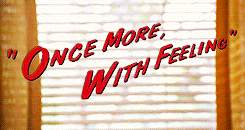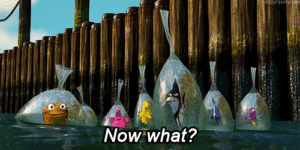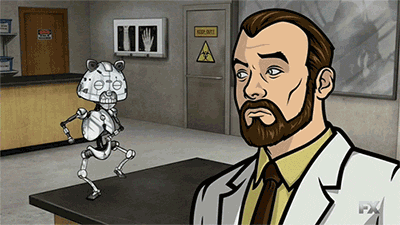The first thing you should know is that Mike and I live in Alaska. It’s a non-contiguous part of the United States of America that we bought from Russia in the 1867 and became an official state in 1959. We live in houses, we have the Internet, and we do not have penguins.
The second thing is that the state capital of Alaska is Juneau. It’s a sleepy town on the southeast coast, a region otherwise known as the “panhandle” (after its resemblance on a map). Southeast Alaska hosts a number of similar communities (Skagway, Ketchikan, Sitka, etc.) that are not connected to the road system. Instead, the only way to access these towns is by air or water. If you, as a constituent, want to visit your state legislature in Juneau, you can either buy a discounted flight on Alaska Airlines, or you can ride the Alaska Marine Highway for a few nights, pitching a tent under the stars on the deck of a ferry and breathing in diesel exhaust.
The last thing you should know is that these coastal towns, with the state capital included, run on tourism. Some sustain themselves by fishing, or timber, or possibly mining, but tourism supports their economy by an overwhelming margin. With summers in southeast Alaska being temperate and gorgeous, and the quaint seaside towns having rich histories with the gold rushes and the state’s formation, the southeast is massively popular with cruise ships. Shops and storefronts open up mid-May. The deep water ports are flooded with millions of tourists checking ‘Alaska’ off of their bucket list. The locals suffer the onslaught from May to late August. And then mid-September the cruise ships stop coming, and the boat people disappear, and the shops are shuttered for the winter.
At this point in the entry, you start to wonder what I’m getting at. Am I writing about the tourism industry in Alaska? Am I trying to sell Alaskan cruises? Is this a “Mister Josh Goes to Washington/Juneau” kind of a story? Am I about to break into a blistering five part series on my opinions about local Alaskan politics?
Rest assured: I am writing about none of those things. But honestly, you should have some idea by now, right? Three paragraphs in, and you, as a reader, should have some idea what an author is trying to talk about. That’s his or her job, right? They need to hook you, reel you in, get you interested enough so you don’t keep scrolling. Intro, Question, Discussion, Hypothesis, Transition. And hold on, this is a blog about writing, isn’t it? Why aren’t I talking about that? I was sold a bill of goods, sir!
Sorry everyone. Let me try again. I’ll get it the next time, I promise. Okay!
The first thing you should know is that Mike and I are improv adjacent. What I mean by that is that quite a few of our friends are members of the improv comedy scene in Anchorage, Alaska. In fact, if you Google us, you’ll quickly run across us being listed as ‘staff’ for one of the troupes in town. What this means is that I host a few websites, and Mike has helped out with videography at times. Other than that, you will never find us on stage, and for the most part, we are entirely unfunny (even when we try hard).
The second thing you should know is that Alaska, mysterious and quaint and The Last Frontier and all that, actually hosts its own improv festival (the Alaska State Improv festival, or ASIF). It is hosted in Juneau (the state capital, as mentioned above), and invites troupes from across the state as well as across the nation to come, perform, network, and learn about the craft.
The third thing that you should know is that, for whatever strange reason, I decided to go to ASIF in April 2015. Well, I suppose the reason isn’t all that strange: I enjoy watching improv, I like hanging out with my friends, and despite having grown up in Alaska, I had never been to Juneau. It also helped that mileage tickets were cheap, and I could share the cost of a room with my friends who were also traveling there as part of the festival.
Er, well. That was just as bad, wasn’t it? I mean, I sort of tied it together with mention of Juneau, but… is this now Josh’s travelogue? What the hell does this have to do with Skysail? Or airships? Or writing? This asshat just wants to talk about his friends who do that Whose Line Is It Anyway? shit. If I wanted to see comedy, I’ll watch a comedian. Besides, there’s no way that they just come up with all that stuff on the fly. Someone told me that they rehearse that shit. It’s all just an act.
…is what you might be thinking. I haven’t sold you on the topic. I just keep listing three things that you don’t care about. As an author, I have to make you care. Okay. Okay. One more chance, alright? I’ll get it this time.
The first thing you should know is that I was a little hung over. We’d gone out drinking with the other improvisers the night before. Not overboard. Just your normal, run-of-the-mill drinking. Just professional improvisers and comedians from across the nation. Just your friends who share their passion for the craft. And then you, the weird, dumpy guy that runs their website that happened to have enough airmiles. All in the only open bar in Juneau, the shuttered, ghost town of the Alaska state capital in late April, waiting for the boat people to come.
The second thing you should know about is pelmeni. A pelmeni is a meat/cheese/whatever filled dumpling. They can be prepared in a lot of ways, but the only way I’ve ever had them is with a sort of spicy curry and sour cream. The only time I’ve ever had pelmeni is well into the early morning hours, and only after drinking for a time (but not overboard). And the only place I’ve had pelmeni is at the 24-hour pelmeni place in Juneau. The memory of Juneau tastes like curried pelmeni and sour cream.
The last thing you should know is that I was alone. I do this a lot. I’m pretty far from neurotypical, and nowhere near my friends, the hyper-charismatic stage performers. My capacity for socialization has a pretty low ceiling, and the quality of my interactions is somewhere between ‘cheap human knockoff’ and ‘an alien insect wearing a Josh suit.’ I’m well aware of my orthogonality, which feeds my anxiety monsters like delicious, delicious midnight pelmeni. It doesn’t matter if it was the night before. Anxiety sticks with you. The best and only solution is to vent to atmosphere. To take a walk. To be nobody for a while. To be alone.
So, maybe an improvement? I don’t know. We introduce a character, his problems, his emotional state, and his whereabouts…. a little unclear on whether we’re being moody or making a curry-farts joke, but these are just, well, parameters aren’t they? Parameters for the human experience. Now you have a toe-hold, a handle on whatever weird emotional truth the author is trying to communicate. If you can relate, then maybe that is inching you towards caring. But you are still missing something: purpose. In improv parlance, you need an objective, a reason to drive the scene forward, a problem for the characters to solve. Otherwise, you just have heads that are talking, whining about social anxiety and being hung over.
The first thing you should know is that I had hours and hours to kill. Everyone had gone off to their improv worshops. To learn about adding emotion to their scenes. To learn about making good use of gender. To practice singing a song that you make up on the spot. Skills so beyond my ken that I laughed when they asked if I wanted to tag along. I had already walked up the hills of Juneau, and then back down them, and then visited a museum, and it was still early.
The second thing is that, while I love most movies, the ones that really get to me tend to have three things: sad robots, sharp (or at least minimal) dialog, and long, dark gazes into the wreckage of the human soul. So, you know, WALL·E.
The last thing you should know is that Alaska is weird with its movie releases, particularly the more remote parts of the state. We might live in modern houses. We might have the Internet. But we still get feature film releases later than the lower 48. And the stranger, art-y films that have limited release? Good luck.
So, I’m walking around Juneau, a little hung over, burping up late night pelmeni, and I see a poster for Ex Machina, having just opened at the movie theater in downtown Juneau (months after its actual theatrical release).
I look at my wristband to check the time, and I still have forever. The movie is starting soon. I buy a ticket. They ask me to surrender my backpack. I take a seat, and I’m the only person in the theater. I tweet that the theater is playing the Jurassic Park theme song on repeat, and that I’m sort of into it.
Two hours later: I was surprised as hell, the movie was great, and I immediately wished that somebody else had seen it with me. If you haven’t seen it, you should.
Somewhere in the middle of the film, there is this scene:
The scene stuck with me. As an aspiring author, or rather, someone responsible for creative output, the idea that art could be created without purpose, without context, without conscious effort, was interesting. It meant that anything could be art. And that part of the human experience was subject to machinery we will never understand. And whether art was effective was not just if it had purpose, but just a matter of whether or not it struck a chord in somebody who gave it the time of day.
That’s the thing, though. I knew about Jackson Pollock. Well, I knew of him. I knew that he was a drip painter. I knew that he made art, and that it was important somehow, even if I didn’t understand it. But until Ex Machina came along, I had no context. I did not know the conversation that surrounded Pollock, or what his paintings meant at the time they were painted. I just knew enough to answer exam questions for my Art Appreciation 101 class I took freshman year in college. Drippy paintings? B. Jackson Pollock. Points, please.
So. The question is context. Music, paintings, writing, all art exists with some context. Everything is inspired, derived, or references something else that came before it. Some art defies understanding without knowing the context surrounding it. I absolutely needed context to understand the importance of drip paintings. And the only way I was able to acquire that context it was to watch a movie about not trusting female robots after a night of drinking in a strange, desolate town in strange, desolate part of the world that everyone says they want to see someday.
You needed context. You, dear reader, might not have known about Juneau. Or Alaska, and its tiny but proud improv community. Or why I was walking the streets of Juneau alone. Or why I went to see a movie while I was technically on vacation. Or why I taste curry every time I think of Alaskan politics. Or that writers, or really, any artists, struggle to balance the context of their art with the content of their art. It took me three tries to get it right in this article. And even then, I’m not sure I struck a proper balance.
Mike and I struggle with this just the same. We’ll want to introduce a new idea, a new concept to the world of Skysail, but one of us will have read a book in which something similar happens. Or we’ll find an article on TVTropes that just skewers us for even thinking about it. Or we’ll gum it for a bit and determine that it’s either too “young adult,” or too “Final Fantasy,” or “too Josh,” or “too Mike,” or even not enough.
The struggle is not that we are trying to create something so entirely unique, so defiant of context that we can draw no lines to anything else. That is the way of pain and suffering, and just produces something that looks like noise (or a drip painting). The struggle is acknowledging your context. The struggle is communicating all the necessary details such that your audience is in the right frame of mind. The struggle is to provide those details at the exact right time so that nobody is bored, or overwhelmed, or confused. The struggle is to draw a circle around something, and hope that our reader draws the exact same circle.
The first thing you should know is that we’re writing novels about airships, a common staple in fantasy and steampunk stories.
The second thing you should know is that the main protagonist, Vasili, is an amalgam of what we remember of our 14-year-old selves as we entered adulthood and experienced an indifferent world.
The last thing you should know is that there are cats.
That’s all you need to know to enjoy Skysail.
Oh. And you should know that Mike finally saw Ex Machina. And his comment was, “Oh man. Josh must have really liked this.”




















